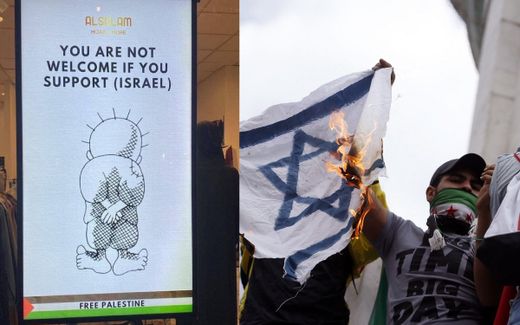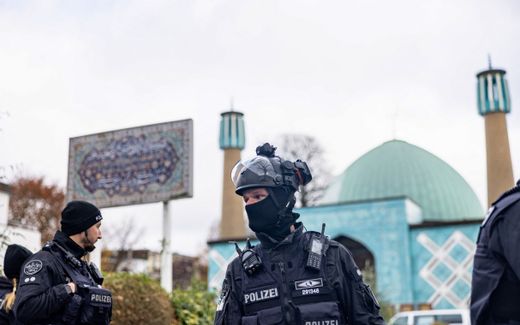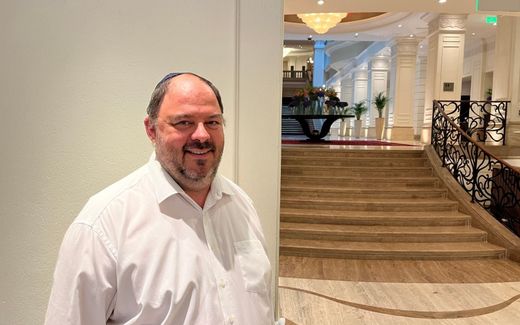How Europe has not learned; anti-Semitism still seems to blossom
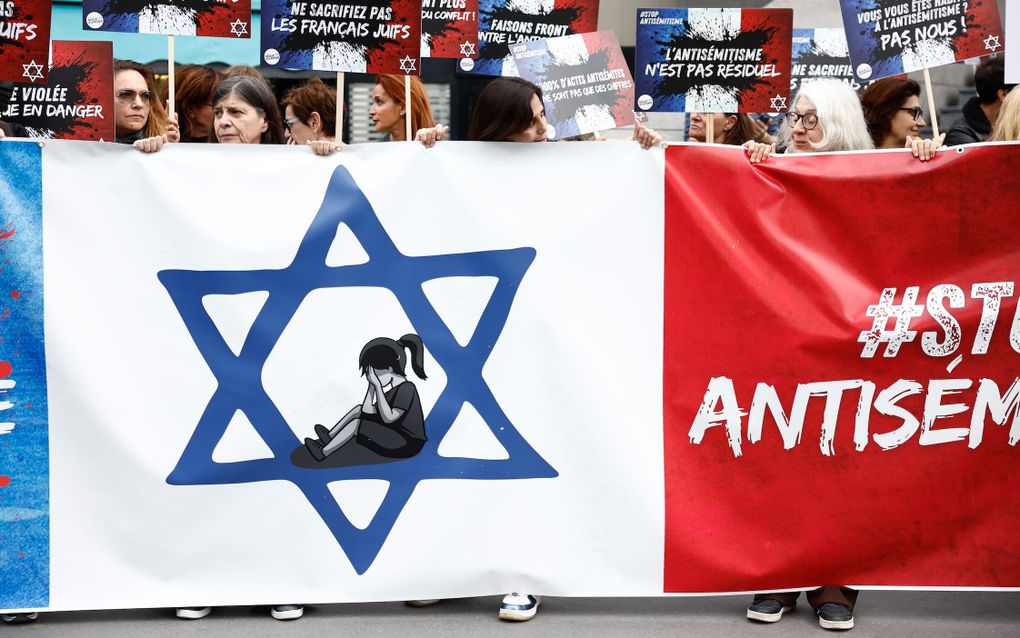
Protest against the rape of a Jewish girl the French capital Paris. Photo AFP, Mohammed Badra
European Union
The Israel-Gaza conflict has triggered a threatening animal in Europe. In all countries, anti-Semitic acts are rising. For many Jews, life is getting more difficult by the day. And nobody knows where this will end.
When the National Holocaust Museum in Amsterdam opened in March, trouble was already brewing after its grand opening. On March 10th, a group of unidentified people chanted “Juden raus” (Jews out) in German and shouted “Joden rot op” in Dutch (Jews, get lost!) at another group of fifteen people en route to the newly opened museum.
As a result, the Central Jewish Consultation (CJO) filed a complaint; alleging that several were guilty of using “threatening language and hate speech” at the group of people going to the museum. As reported by the NL Times, the police launched an investigation into the incident since the Dutch Public Prosecution Service considers such words as “threatening language and hate speech.”
However, as the investigation progressed, no witnesses could be found. Drones and cameras had been set up but not in the area where the incident happened. Eventually, prosecutors dropped the case, but antisemitism continues to surface within several investigations throughout the EU.
Denmark
In Denmark, the nation’s Jewish Society reported a total of 121 incidents last year that involved the use of threats and vandalism, according to a report from Kristeligt Dagblad. This is the highest since the Jewish Society started recording these incidents in 2012.

At least 17 of those in the recent report involved children. In one incident, two boys drew a swastika symbol next to a Jewish student. Another Jewish boy was pinned against the toilet and was told that “He must die because he is Jewish” and that “all Israelis must die”.
Danish Minister of Justice Peter Hummelgard said that the report remains deeply worrying. “It is reprehensible, and I can only distance myself from the blunt individuals who subject our Jewish fellow citizens to such atrocities,” he said in the Kristeligt Dagblad report.
Germany
When it comes to Germany, the Frankfurter Allgemeine reported that antisemitic incidents have almost doubled from 26,641 to 5,154 within recent months. In the first quarter of 2024, at least 756 crimes were suspected to have “anti-Semitic motives”, according to the nation’s police records.
Switzerland
Moving south toward the German-speaking part of Switzerland, an Orthodox Jew suffered from life-threatening injuries when an unidentified youth stabbed him in Zurich. The NZZ reported that the youth told the victim’s family members that it was his “Muslim duty to act” and also said: “I am Swiss. I am Muslim. I am here to kill the Jews.”
The attack has continued to raise questions about the youth’s ties to radical forms of Islam and his environment before committing the crime. In response, Zurich’s Association of Islamic Organisations said regarding the attack that it was “Not in our name!” and also wrote in their press release that the “entire Muslim community in the canton of Zurich condemn the attack on our Jewish fellow citizen.”
In another NZZ article, the Swiss parliament responded to the high number of anti-Semitic incidents by doubling the security subsidies within their Jewish communities.
Holland
In the Netherlands, the Center for Information and Documentation Israel CIDI recorded 370 incidents that can be classified as “anti-Semitic.” This is at least 2.5 times more than what was seen in 2022, with 195 incidents.
When the Israel-Hamas war broke out on October 7th 2023, that figure increased even more- at least 150 per cent. However, the report said that that number was already nearing last year’s rise in 2022. Many of these incidents involved “real-life expressions”, which include threats, violence, name-calling, and aggressive acts over WhatsApp. What is more, many Jewish institutions, organisations, and individuals encountered a 435 per cent rise in “written name callings and death threats”.
France
France has witnessed a “three-fold increase” in the number of anti-Semitic incidents since the Israel-Hamas war. In one of Paris’s suburbs in France, a 12-year-old girl was beaten and raped in a shed by three adolescent boys. According to Dagen, one boy was twelve, and the other two were thirteen years old. One thirteen-year-old boy was released because he was not directly involved in the rape. Still, the other two remain arrested and detained by police.
The mayor of the Paris suburb Courbevoie condemned the incident. He promised that age would not be a factor and that they would be tried by the “full force of the law.”
One Jewish man who wishes to remain anonymous has lived in several countries, including France, Poland, and the US. To CNE.news, he said that there is no safe destination for European Jews now. Some have moved to Portugal, which is seen as more Jewish-friendly, while others have found refuge in other countries, such as Cyprus. “Everything was horrible,” he said. “I’m still recovering from the hatred of working in Poland.”
While living there, he worked in the hate speech department at Google as a content moderator for YouTube. The job forced him to view videos that contained some of the most vile, anti-Semitic content directed toward Jewish groups, he said.
Although he grew up in a Polish-Jewish family and views the Polish language as “nostalgic,” he stands by the statement that the country and the entire European continent remain hostile places for Jews. “I had difficulties finding sympathy, empathy, and making friends,” he said about his experiences in Poland.
He also said that the Polski Żyd (Polish Jew) is still under intense scrutiny and noted that much of this attitude is deeply rooted in Polish history. “The Poles are suspicious of the Polish Jew, though none are living in Poland. It is an irrational fear of the Jew,” he said.
Jump
As for solutions, it is important to identify the breeding grounds for hate speech and violence. According to the National Coordinator for Combating Anti-Semitism in the Netherlands, Eddo Verdoner, the country has seen “an enormous jump” in anti-Semitic incidents. The latest police reports have increased in their seriousness, he said. “We see, in addition to an increase, there is also a hardening of anti-Semitism. It is no longer limited to words alone. That is extremely worrying”.

Verdoner also said many interactions began in WhatsApp groups and ended as real-world attacks within schools and communities. “We realise that the online and offline have become intertwined,” he said. “The effect on the physical world is becoming bigger.”
In preventing future attacks, Verdoner said that he is currently working with the national police as well as school and city leaders in combating future anti-Semitic incidents throughout the country. His office sent a letter to parliament outlining specific actions, including a plan to improve Holocaust education.
They have also held discussions with city mayors on combating the problem at the community level. Verdoner and his team also started an initiative for online platforms to share expertise on filtering and blocking antisemitic books on their platforms.
For now, setting the record straight and dispelling the lies in the Jewish support for genocide is essential, according to Conrad Myrland in his editorial in With Israel for Peace in Norway (Norwegian for Med Israel for Fred or MIFF). Myrland, the organisation’s general manager, first provided some context for his stance. He said an unknown person recently targeted their organisation when a poster was inserted in a Clear Channel advertising frame at a Trondheim bus stop.
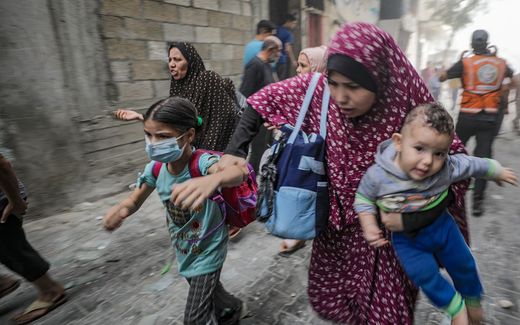
The poster contained Conrad Myrland’s face along with the words “With Israel for Genocide”. The incident was reported to the police and later taken down. While anti-Semitism may have reared its ugly head in recent days, hatred for the Jews and Israel can be traced as far back as the thirteenth century. Days before Easter, a young boy was found murdered in England.

The boy’s uncle, who was a local priest blamed the Jews for the killing. However, the police found no evidence that the Jews committed the crime. Still, the unfounded accusation that the Jews killed the boy continued to spread and haunt their communities.
As hatred for the Jews continues to spread, Myrland calls for a correction on the controversial term, “genocide,” which is often associated with Israel’s recent actions against Gaza. He quotes the words of US spokesman John Kirby, who urged the public that Hamas intends to “wipe Israel off the map and warned them of their repeated desire for “genocide” against Israel.
“And what happened on October 7? Murder. Slaughter of innocent people in their homes or at a music festival. There are genocidal intentions. (…) But Israel is not trying to wipe the Palestinian people off the map. Israel is not trying to wipe Gaza off the map. Israel is trying to defend itself against a genocidal threat. So, if we’re going to start using that word, fine, let’s use it correctly,” Kirby said.
Related Articles




